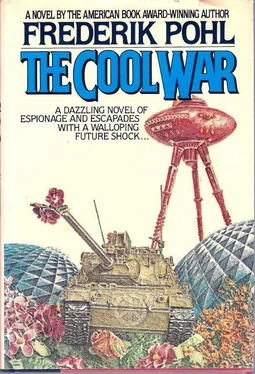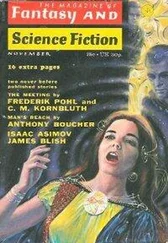“That is splendid, Hake, but please, your shower. We must hurry. Of course you will want a coffee? Then you can tell me all about it. But the taxi is waiting, and my expense account—well, you know what it is like with one’s expenses!”
Actually Hake did not know. He had never had an expense account from the Team. But if what Mario had meant to imply was that his expenses would be scrutinized it seemed to Hake strange that they should take a taxi all the way to Anacapri to sit and drink morning coffee in an open-air restaurant exactly like twenty-five others they had passed on the way; and then to take another taxi all the way back to a restaurant that turned out to be a block from Hake’s hotel, for the lunch Mario insisted he had to have at the stroke of twelve. It seemed to Hake that Mario was not a very efficient secret agent. In fact, flaky. The Mario of Munich and the rest of the flu-spreading trip had been subdued and deferential; this one was more like a plumbing salesman on a tour.
And when the lunch came Mario picked at it. He was obviously much more interested in the nearly nude dancers in the floor show than in eating. He divided his time between staring at them as they whipped off their peasant skirts to reveal nothing much beneath, and nudging Hake and peering at his face excitedly. Hake felt distinctly uncomfortable. Mario had been much the same on the patio at Anacapri, where bar girls in bikinis had served them their cappuccinos. In neither place did he seem very interested in the Islamic youth cult Hake had boned up on out of the Arab-language newspaper and a few discreet questions to the Lebanese night porter at the hotel.
It all seemed like an awful waste of time to Hake, and the situation did not get better. After the lunch Mario had barely picked at, he said, “Well, perhaps it would be as well for you to rest this afternoon. I will meet you for dinner. And then we will plan our activities for tomorrow.”
“What activities? Look, Mario, I came here on a specific mission, and Curmudgeon said it was of the highest priority.”
“Ah, Curmudgeon,” said Mario, shrugging easily. He took a nail-clipper from his pocket, signaled for the check and began manicuring his already perfect nails. “At Headquarters what do they know of us in the field, eh? You are doing very well, Hake. There is no need to try to impress the home office with your diligence. In our work it is always essential to move with precise knowledge, according to a plan. Speed? Yes, sometimes. But caution and precision, always.”
“But—”
“Hush!” Mario gestured at the waiter, coming to bear away check and credit card. “Have the goodness to postpone this conversation to a more opportune time,” he said coldly. Then he dropped his napkin—on purpose, as it appeared to Hake—and bent down to retrieve it. There was a quiet but definite sputtering sound from under the table. The lights went out, and Mario sat up, rubbing his fingers.
Hake stared. “Mario! What the hell did you do?”
“I warn you again, Hake, not here! Have they taught you nothing in Texas?” Mario whispered furiously. They sat in angry silence until the waiter returned, carrying check and card, his expression embarrassed. Hake could not understand a word of the Italian, but the sense was clear enough. Due to this wholly unforeseeable interruption to the electricity, the computer was unable to process the credit card.
Mario held his hand up forgivingly. “Capisco,” he said. “Va bene. Ecco—due cento, tre cento, tre cento cinquenta, e basta. Ciao.”
“Grazie, grazie, tanto, arrivederla,” said the waiter, clutching the wad of lire gratefully.
And walking along the crowded street, on the short block back to the hotel, Mario said, “Yes, of course it was I. Why do you think I selected that table? There was an electric outlet beneath it for the cleaning. Have you not been taught, it is the little things that add up?”
“And last night in the hotel. Did you do that, too?”
“Of course I did, Hake. Both the electricity and the flooding. I wedged the lock in that room door, and when I left you I turned on their taps, just a trickle, with a washcloth stuffed in the drain. Were you not taught such things?”
“Christ, no.” Hake thought silently for a moment. At the steps to the hotel he said, “You know, all that seems pretty chickenshit to me. You’re just annoying people. You’re not doing any real damage.”
“I see! And that is not worthy of your efforts, Master American Spy? What a pity! But it is exactly this that we must do, on a small scale or large! The lit match in the mailbox. The phone off the hook. The emergency cord pulled in a tram at the rush hour. Each is tiny, but together they are great!” -
“But I don’t see—”
“But, but, but,” said Mario, “always there is a ‘but’! I have no time to explain these simple things to you, Hake. I have much to do. Go inside. Swim in the pool, meet some signorinas—you may take off your bracelet, and then you will see! And I will meet you tonight for dinner—and,” he twinkled, “perhaps I will have a surprise for you! Now go, I do not wish to be seen too often in your hotel.”
But when they met later, Mario’s mood had changed again. He drove the three-wheeled Fiat-Idro vengefully along Capri’s narrow roads. After ten minutes of it, Hake asked, “Are you going to tell me what you’re angry about?”
“Angry? I am not angry!” Mario snapped over the noise of the wind. And then, relenting, “Well, perhaps I am. I have had sad news. Dieter is in jail.”
“That’s too bad,” Hake said, although in his heart he was not moved. “What’s he in for?”
“For the usual thing, of course! For doing his job.”
Mario drove in silence for some minutes, and then, surprisingly, his face cleared. Hake stared around to see why. They were passing through an olive grove, where crews of Ethiopian laborers were cutting down trees, stacking them and burning them. The smoke drifted unpleasantly across the road. It was a hot evening anyway; the wisps of steam from the Fiat’s exhaust vanished almost at once into the air, and the laborers were glistening with sweat. But Mario seemed pleased. “At least some things go well,” he said obscurely. “Now observe, we are almost there.”
Their destination turned out to be an open-air trattoria on the brink of a precipice. They drove under a vine-covered arch, atop it a bright liquid-crystal sign that showed what looked like an ancient Roman peasant being shampooed with a huge fish. The name of the place was La Morte del Pescatore. Mario tossed the Fiat’s keys to a parking attendant, and led the way between tables and waiters to a banquette overlooking the cliff.
And there, beaming at them, was Yosper.
“Well, Hake!” he said, rising to shake hands from the meal he had not waited to start, “so we meet again! Are you surprised?”
Hake sat down and spread his napkin on his lap before. he answered. When he had seen Yosper last it had been in Munich, along with Mario and Dieter and the other two young thugs who had accompanied him; and none of them had responded by word or hint to any of his overtures about the Team.
“Not really,” he said at last.
“Of course you weren’t,” Yosper agreed heartily. “I knew you understood we were part of the gang in Germany.”
“Then why didn’t you say something?”
“Oh, come on, Hake! Didn’t they teach you anything in Texas? All information is on a need to know basis, that’s doctrine. There was no need for you to know; you were doing fine without it. And declassifying is always contra-indicated when it might jeopardize a mission. Which it could have; who knew what you might take it into your head to do? The whole point of what you were doing was that you were a simple man of God, doing the Lord’s work in Europe. What better cover could you have than to believe it yourself?” He raised a hand to forestall Hake. “And then, of course,” he said, “that was just your first training mission. We all do a blind one first. That’s doctrine, too. Can’t expect special treatment, can you, Horny?”
Читать дальше












